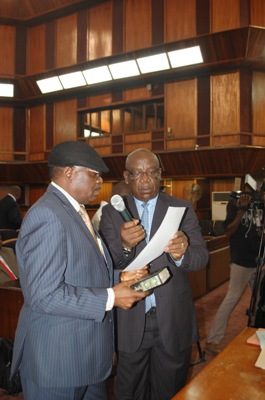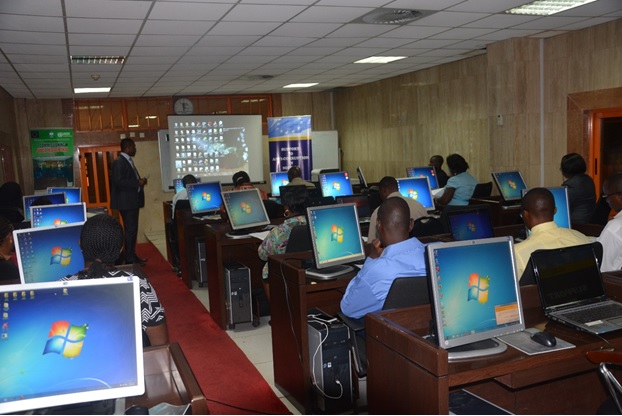The Chief Judge Hon. Justice I. U. Bello has directed for the immediate posting of the following Directors/Heads of Departments as indicated below;
FCT HIGH COURT GETS A NEW CHIEF JUDGE
Following his screening and confirmation by the senate on the 27th day of May 2015, Hon. Justice I. U. Bello has been made the substantive Chief Judge of the FCT High Court.
DISCIPLINE OF LAWYERS
The general public is hereby inform that the Legal Practitioners Disciplinary Committee has directed the Chief Registrar of the Supreme Court of Nigeria to strike-off the names of the following persons from the Roll of Legal Practitioners in Nigeria. Thus are no longer eligible to practice.
i. G. T. Ahembe
ii. Chikwendu Kalu
iii. Anthony Ojigho
iv. Temidayo Eseyin
v. Mbadiwe D. Ndupu
vi. Gabriel Gbenoba
vii. Victor Chiedu Nwoye
And also to suspend forthwith, FABIUS JEMIDE ATIE from carrying on the trade of business as a Legal Practitioner for a period of five(5) years.
FCT HIGH COURT GETS 20 NEW MAGISTRATES
The Hon. Chief Justice of the FCT High Court, Hon. Justice I. M. Bukar on the 26th of March, swore-in 20 newly appointed Magistrates for the FCT Judiciary namely:-
| S/No | NAME | RANK |
|---|---|---|
| 1. | ACHEGBULU OLUBUNMI | SNR MAGISTRATE I |
| 2. | THERESA N. OKWEJIE | MAGISTRATE I |
| 3. | IBEGU L. ABHIRANYAM | MAGISTRATE I |
| 4. | ABBA ALIYU HAFSAT | MAGISTRATE I |
| 5. | SA'ID BUKOLA | MAGISTRATE I |
| 6. | YETUNDE ONABANJO | MAGISTRATE I |
| 7. | AISHATU AUTA IBRAHIM | MAGISTRATE I |
| 8. | EBIWARI E. DAMINI | MAGISTRATE I |
| 9. | NJIDEKA KENECHUKWU | MAGISTRATE I |
| 10. | AUDU OJOCHENEMI | MAGISTRATE I |
| 11. | YUSUF MARYAM FARIDA | MAGISTRATE I |
| 12. | EGBE RAPHAEL | MAGISTRATE I |
| 13. | TERIBO ZIMIZU ZIM | MAGISTRATE I |
| 14. | IBRAHIM YUSUF | MAGISTRATE I |
| 15. | ABDULMAJID ONIYANGI I. | MAGISTRATE I |
| 16. | ABDULMUMINI OMEIZA | MAGISTRATE I |
| 17. | FATIMA I. BUKAR | MAGISTRATE I |
| 18. | NUHU ABBA TUKUT | MAGISTRATE I |
| 19. | ABUBAKAR S. UMAR | MAGISTRATE I |
| 20. | TANKO MUNIRAT M. | MAGISTRATE I |
TRAINING OF SECRETARIES
Thirty secretaries of judges and registrars of the Federal Capital Territory (FCT) High Court (HC) are receiving a two-week basic skill of computer operation, use of the e-filing platform and the internet under the “Support to Anti-Corruption in Nigeria” project. The project is been funded by the European Union (EU) and is implemented by the United Nations Office on Drugs and Crime (UNODC).
Building the capacity of secretaries to judges and registrars on the use of computers and operation of a case management system (inclusive of an e-filing platform) at the FCT HC, will directly enhance the development of a database by the FCT HC and ultimately position the court to link up to a centralized database platform to enhance justice delivery in general and anti-corruption in particular.
The “Basic Computer Skills for Justice Sector Officials Training Manual” previously developed by the UNODC would be used as the main training material as well as Information Communication Technology facility deployed at the FCT HC Judicial Research Center, Maitama, Abuja, under the EU funded “Support to the EFCC and the Nigerian Judiciary” would be used as the training facility. Participants are drawn from the six judicial divisions of the FCT HC.
An institutional capacity assessment of the Federal Capital Territory, High Court (FCT HC) was conducted in 2014 under the current project. Part of the findings of the assessment is that the FCT HC has already commenced the deployment of a case management system, beginning with an e-filing platform. The assessment also indicated that there is a need to build the capacity judges and court staff in the use of Information Communication Technology (ICT). Subsequently, the management of the FCT HC identified as priority, ICT training for secretaries of judges in preparation for the full deployment of the e-filing system.
At the end of the training, participants are expected, to perform basic coupling of computers and operate computer systems and accessories; use Windows 7 programmes including MS Word, Power Point and Excel; access the internet, conduct basic search and use email accounts; understand the basic workings of case management and e-filing; and have a basic appreciation of legal words and phrases used in court proceedings.



